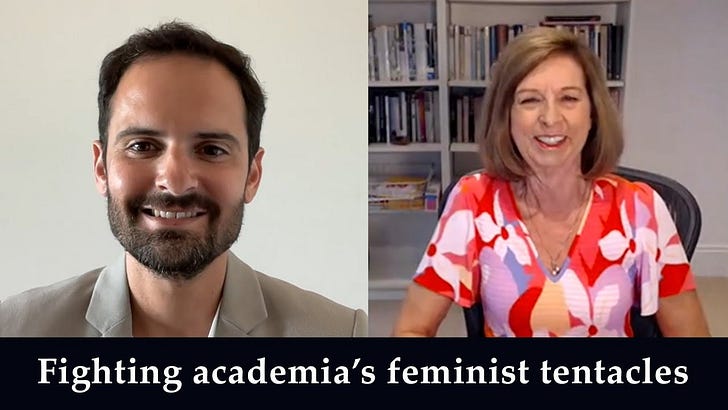
In August of 2020, one the highest ranked exercise science journals, called Sports Medicine, published a commentary titled, “Gender-based violence is a blind spot for sports and exercise medicine professionals.” The commentary was problematic for a variety reasons, and this prompted Dr. John Barry of the Centre for Male Psychology, Deborah Powney of the University of Central Lancashire, and me to team up to write a letter to the journal’s editor challenging the ideas put forward in the paper. Because our letter is not available open access, I will read it aloud here. However, before reading it, I thought I would share the unusual experience we had in getting the letter published.
We submitted the first version of our letter to Sports Medicine on September 29 of 2022. I was surprised to see that the editor decided to send our letter out for peer review. The reason that I was surprised is because letters typically do not undergo peer review.
Letters are typically no more than 500 words, thus standard practice is for a chief editor to make a unilateral decision on whether a letter is appropriate for publication, and this based on factors such as whether the arguments in the letter are valid and professional and whether the journal has space to publish a letter in an upcoming issue. I was further surprised because I have previously submitted letters to Sports Medicine and none of them have undergone peer review. So, I asked the editor why he was sending this letter out for review. His response was that the journal was now instituting a policy that letters will be sent out for review if they are on topics that are “potentially controversial.” What’s more, the editor decided to send our letter out to three peer reviewers – three! Full-length manuscripts oftentimes are not sent out to threepeer reviewers. Clearly, the editor was being cautious with our letter on gender and violence.
On December 6 of 2022, after our letter was under review for approximately two months, we received the reviewers’ comments. Their comments were minor, and all three of the reviewers agreed that our letter should be published, assuming their comments were adequately addressed. So, we revised our letter accordingly, improved its quality, and we resubmitted the letter on December 15 of 2022.
At this stage, given that the reviewer comments were fairly minor, many editors would not send the letter out for another round of reviews. Yet, the editor decided to send our revised letter back to the peer reviewers, creating unnecessary delay in the publication process. As expected, the reviewers acknowledged that we had made all of the necessary corrections, and they provided their final stamps of approval for our letter to be published.
However, per standard publishing practice with letter exchanges, we had to wait for the researchers who we were challenging to respond to our letter. We expected to have to wait another month or two. But, to my surprise, the editor chose to send the researchers’ reply out for peer review as well. This was a shocking decision because why would the researchers’ opinion of our critiques need to be commented on by peer reviewers? It was one of the dumbest and most unnecessary editorial decisions that I have experienced in my 16 years of publishing research. Yet, the oddities of this letter exchange and review process did not end there.
Over the course of the subsequent five months, from January of 2023 to May of 2023, I sent the editor multiple emails inquiring about the status of the researchers’ reply and when we might expect the review process to be completed. In March, I was told that the researchers’ reply was under review, but delays had been experienced in the process, and that the process should be completed in the next couple of weeks. In April, I still had not heard of a final outcome regarding the letter exchange, so I sent an email to the editor explaining in a professional manner that I thought the way that the letter exchange was handled was inappropriate and inconsistent with standard editorial practices. I informed the editor of my background as a frequent letter writer and as a researcher who has studied and published on the roles of letters in the scientific process. I argued that a letter is intended to be a short communication that is quickly made available to the journal’s readership, because doing so would help to slow the transmission of the problematic ideas presented in the original paper. The editor acknowledged my concerns and then informed me that the researchers’ reply was going through another final round of revisions.
Another month went by, and the review process was still incomplete, so I once again emailed the editor asking for an update. The response I received was not what I was expecting. The editor informed me that the researchers had decided to remove their reply from consideration for publication. The editor did not tell me why the researchers made this decision. Perhaps, after reading our letter and after receiving feedback from reviewers, they realized how wrong they were in their paper. An unfortunate result from all of this is that our letter was completed in December of 2022 and could have been published at that time. Instead, six months have gone by, allowing for their misguided ideas to transmit throughout academia without criticism.
On the bright side, our letter received positive appraisals from three independent reviewers and the journal has published the letter even though it is on a supposedly “controversial topic.” I will now read the letter. Please note that all of our statements are supported with references to peer-reviewed research papers.
Also, if you enjoy our letter, and you appreciate academics who are willing to take off the gloves to restore sanity in these confusing times, please consider supporting The Nuzzo Letter with a donation. Your support is greatly appreciated as it helps me to continue to work on independent research projects such as this letter. Now, to the letter:
Dear editor…
[listen to the audio]
Relate Content at The Nuzzo Letter
SUPPORT THE NUZZO LETTER
If you appreciated this content, please consider supporting The Nuzzo Letter with a one-time or recurring donation. Your support is greatly appreciated. It helps me to continue to work on independent research projects and fight for my evidence-based discourse. To donate, click the DonorBox logo. In two simple steps, you can donate using ApplePay, PayPal, or another service. Thank you!















